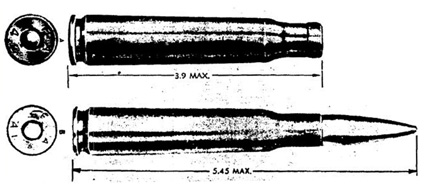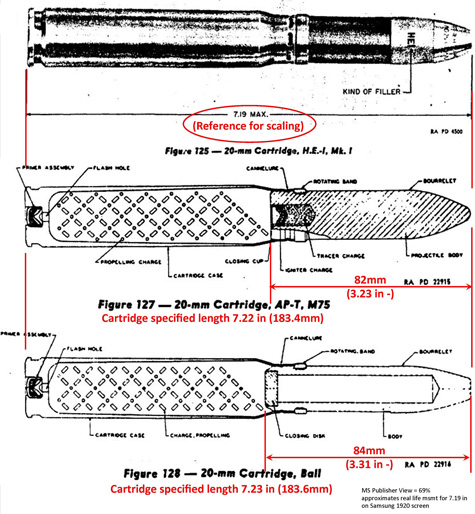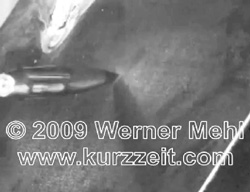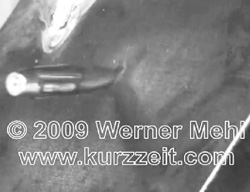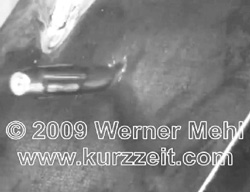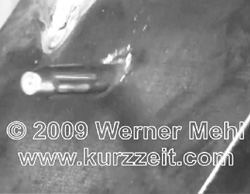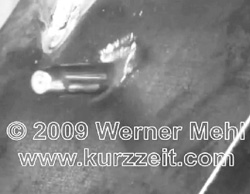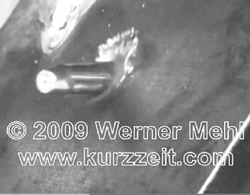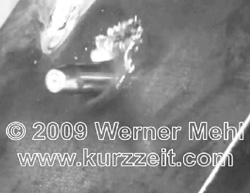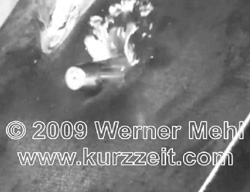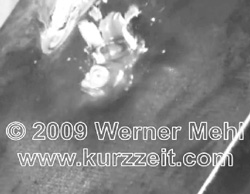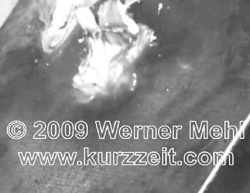| N 18°32.300 E 99°03.000 |
Ban San Khayom Bridge (Th: สะพานบานสันกะยบม / Jp: バンサンカヨム橋) Page 10 of 11 |
Railroad Sta |
| Text | Notes |
|
Complete Round . . . is known as a cartridge, and is made of the following components: 1. Cartridge case. Cartridges are usually described primarily by their calibre (or caliber in the USA) . . . [and] the length of the cartridge case.[N15a]
A .50 caliber armor piercing projectile was 2.31 inches (58.7mm) long.[N16] 20mm (20 x 110mm) projectile length At one point, I was concerned about the dimensions of a 20mm bullet --- early sketches (now deleted) showing projectiles passing through Point A were proportioned for dimensions of a 50BMG. Not able to find the dimensions of 20 mm projectiles (conversely, lengths of cartridge casings and overall lengths of cartridges seem readily available), I scaled illustrations in Ammunition Inspection Guide:[N17]
Note that the nominal 110mm dimension of the cartridge case (20 x 110mm) scales out at 115mm, so the drawing is not accurate. Miscellaneous specs: HS.404[N17a] Muzzle velocity: 880m/sec = 880m/sec x 3.28 ft/m = 2,886 ft/sec Speed of sound at STC: 343 m/sec (1,125 ft/sec) Spin: Muzzle velocity: 880 m/sec RPM = 880m/sec x 60sec/min x 1rev/1.6m = 33,000 rpm
1 million fps slow motion video of bullet impacts made by Werner Mehl demonstrates the capabilities of hyperspeed photographic equipment offered by Kurzzeit, manufacturer of Bullet Speed Chronographs and Real Time Trigger Systems. The excerpts below offer rare clarity in describing an oblique perforation of a plate. They are taken from a sequence in the range 1:34-1:37 of the video:[R14c] 1. 2. 3. 4. 5. 6. 7. 8. 9. 10. (detail in subsequent frames is lost Unfortunately, there is no data provided to compare with that at Point A. However, by proportion, it would appear that the caliber, or projectile diameter, (d) of the projectile is approximately the same as the angled plate thickness (H) of the target, ie, H=d, or H/d=1.[R14d] Observations: The series of photos records how a projectile hitting an angled plate appears to erode the plate on the "far" side of the impact point.[R14e] The course of the projectile in passing through the target does not appear to have been altered. Unfortunately there is no "after" photo showing detail of the hole.
|
N15.^ Ammunition Inspection Guide , TM 9-1904 (Washington: War Department, 1944), p 181. N15a.^ Anthony Williams, Primer on Cartridges.
N16.^ Ammunition Inspection Guide, p 210. The .50 caliber MG round is better described in this reference than the 20mm round. N16a.^ ibid, part Fig 82a, p 210. N16b.^ ibid, parts of Figs 83 and 84, pp 212-213. Composite made using Microsoft Publisher.
N17.^ ibid, Fig 125 on p 326, and Figs 127 & 128 on p 329. Images captured with Gadwin PrintScreen; composite assembled by author using Microsoft Publisher.
N17a.^ Wikipedia: Hispano-Suiza HS.404.
R14c.^ 1 million fps slow motion video of bullet impacts made by Werner Mehl
R14d.^ Rosenberg, ibid, 2885. See preceding discussion on page 1. R14e.^ The detail compares favorably with separate comment by Christopher Perrien email of 04:00, 03 Apr 2014.
|

